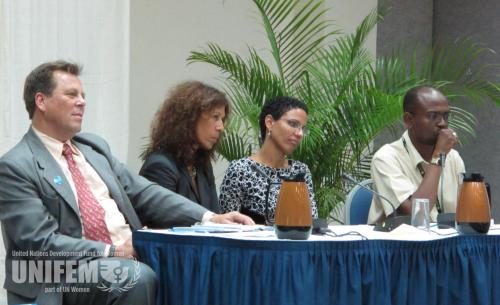Child Support and Gender Equality - The Key to Social Cohesion
Date:
This from Regional Programme Director of UNIFEM, Roberta Clarke who was addressing a UNIFEM/UNICEF panel discussion "Strengthening Social Inclusion and Development: Social Policy Responses in the Context of Small Island Developing States" during the Partners' Forum. The discussion was a lead up to the recently-concluded, 9th Commonwealth Women's Affairs Ministers Meeting held in Barbados June 7th -9th.

(from left UNICEF Area Representative Barbados and the Eastern Caribbean, Tom Olsen; Director General of the OECS Secretariat Dr. Len Ishmael;UNIFEM RPD Roberta Clarke and Social Policy Adviser, Department for International Development (DFID), Mr. Richard Carter.)
"The work that UNICEF and UNIFEM are doing now in collaboration with the OECS and the World Bank is calling for integrated social safety net policy. We are not asking states to spend more. They already spend between 2-4 percent of GDP on Social Safety Nets, not an insignificant amount. Rather we are suggesting a comprehensive approach with well defined principles, with well defined outcome statements, with more appropriate and transparent targeting", Ms. Clarke stressed.
UNIFEM studies of social welfare programmes show that low income women's status of single heads of households is not a qualifying criterion for eligibility for social welfare payments. If fathers are making contributions to households, no matter how inadequate whether or not they are cash strapped, women are not entitled to social safety net support.
"But it is also the case, that many men do not have the resources to contribute enough to take children out of poverty. They too, like their baby mothers are poor. In those cases, we need to be able to develop a social safety net scheme that responds to the needs of the poorest households and do not punish women and men for their experience of deprivation and exclusion. And presently, this is not the case. The work of the OECS shows that a parlous 12% of social safety net funds go to single women headed households."
Ms. Clarke pointed out that social safety nets must empower and referring to Maxine Molyneux's definition of empowerment; that is they must allow for the acquisition of capabilities which have the potential to assist women in achieving autonomy (legal and material), equality (social and personal), voice and influence (over decisions that affect their lives).
Social safety nets must therefore incorporate concerns for ensuring:
- training and resources are allocated to enhance women's capabilities;
- social and economic empowerment of women is an explicit goal (to include
- definable impacts);
- family friendly policies are promoted - acknowledge care giving, childcare arrangements, time management;
- that transforming gender relations is central to the programme, including involving men; and that
- participants have voice in programme aims, design, evaluation and management [1].
Ms. Clarke says such a move towards strengthening the efficacy of social safety nets must be accompanied by a dramatic change in cultural attitudes about the care of children. Men must move to the centre of children's lives in the Caribbean. Women must be empowered to make reproductive decisions that are wholly and entirely independent of economic need. And men and women must stop seeing children as gendered gifts to be made and received.
We certainly need now a better understanding of reproductive decision making in the Caribbean so that we can develop social, cultural and economic programmes that promote gender equality and which protects children.
The UNIFEM RPD added: "On behalf of UNIFEM and UNICEF, I want to call for a comprehensive approach to social safety nets that look not only at the role of the state but also of non-state actors. A social safety net policy ought to confront unequal gender relations in the care economy. At an individual level, the state needs to pay greater attention to ensuring that men make regular, consistent and predictable contributions to the care of children and other dependents, thereby reducing the demands on women's income and time resources. And then of course, the demands on the state".
[1] Maxine Molyneux: http://www.pathwaysofempowerment.org/Pathways_Brief_5.pdf